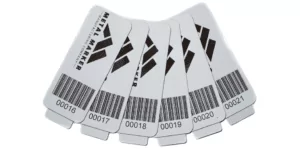The modern supply chain continues to evolve with the development of newer and more efficient technologies. Blockchain is going to be the next step in providing previously unthinkable levels of information on sourcing and logistics – instantly.
With the simple scan of a barcode or QR code tag, a producer or seller can have access to the entire sourcing history for a product or tangible asset.
What is Blockchain?
Blockchain at its core is a permanent digital ledger of information.
Databases have historically been housed on a centralized server. However, this leaves sensitive information susceptible to tampering as well as cyberattacks.
Blockchain subverts this trend by perpetually storing the information essentially in public, with full transparency. The blockchain database exists using a peer-to-peer computer network made up of individual nodes. These nodes not only access the data, but are constantly monitoring the blocks to ensure the data remains constant.
The information is cryptographically stored in “blocks” of data, with each fundamentally linked to the others. Each block contains time-stamped information about the previous one, as well as the next in line when a new block is added. This is where the “chain” term comes from.
Due to the nature of linking all of the data in a chain, if one block is effected, so is the entire chain. This plays a large role in maintaining the security of the information. Even though it is stored in a public manner, blocks cannot be tampered with without impacting the entire chain.
Decentralization
Since this data processing method utilizes a peer-to-peer network, it completely eliminates the need for a third party for transactions. The system directly connects person to person for instant and seamless transactions.
As this technology continues to be tested and adopted, it could have widespread implications for nearly every industry. This is especially true for the financial sector, or other industries which generate revenue from processing services.
Blockchain’s Impact on Supply Chain
One of the biggest places blockchain will impact is the modern supply chain.
A product in today’s global economy may include components from across the world, with various levels of quality and standards.

The reality is we can now have a permanent history of products, from the origin of manufacturing to the delivery to the end user. This also includes the sales documentation such as purchase orders.
In addition, physical assets can be linked to the data using serial numbers, barcodes, and RFID tags.
The information is communicated to all organizations within a given supply chain. This access of data also means these companies must be diligent in maintaining quality standards and agreements.
Full Transparency
We may reach a point in the near future where consumers expect full transparency in the sourcing of their products. This is especially true for the food and beverage industry, which has faced many recent contamination concerns, as well as preference shifts toward natural products.
Companies will be able to trace their products all the way through the supply chain, allowing for quick isolation of problems. For example, in the past it may have taken months to get to the bottom of a quality issue. With blockchain, the issue can be dialed down to the exact time, location, etc., when the issue or malfunction was created.
In addition, when a problem such as a product contamination issue occurs, organizations will be able to swiftly locate every part of the supply chain which has been impacted to resolve the problem.
Metal Tags for Blockchain
Barcode and QR Code Tags
While barcode tags are currently used to track and store information about assets, their new potential is just beginning to be developed.
There are many applications in which these tracking tags can be used. They enable organizations to include any type of physical item or asset into digital tracking.

With a simple scan of a QR code, a wealth of information is at your fingertips. Tangible items become digitized, and their entire record is available.
Logistics organizations are already starting to implement advanced smart bidding and automated systems by labeling inventory with tags.
RFID Tags
RFID tags are used in industrial spaces as traceability of assets and inventory is vital. While computer scanning systems offer plenty of information, the ability to track items throughout the course of an entire supply chain means they will see even newer applications.
Wrap Up
Blockchain is an emerging technology which is set to transform the way many industries function. With greater transparency and security, transactions will be seamless and data will be tamper-proof.
As supply chains continue to embrace this change, they will become significantly more sophisticated and agile. Consumers and companies alike will benefit from increased access to information.
RFID and barcode tags serve as a means to include physical items within this digital tracking space. They are essential to the new modern supply chain.